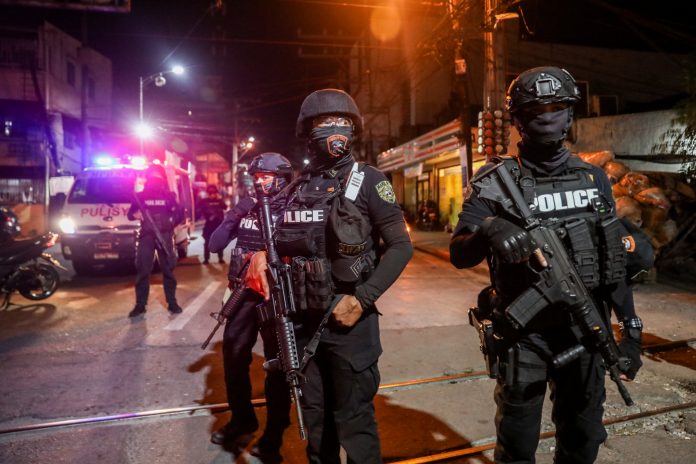The Philippines’ House of Representatives is set to vote later this week on an anti-terror bill that could place all manner of dissent under the “terrorist” label.
Two key committees of the chamber convened last week for a video conference to pass a version similar to that passed by the Philippine Senate in February.
The passage of the bill looms as the country eases back from two months of strict quarantine measures highlighted by alleged police brutalities in the implementation of quarantine protocols, a dearth in social welfare nets, and inefficiency.
“It will be the manual or handbook for an omnipotent Big Brother in a police State,” warned lawyer Edre Olalia of the National Union of People’s Lawyers.
“It will terrorize targeted critics, dissenters and social advocates more than the real terrorists,” he said.
President Rodrigo Duterte and allies in Congress have insisted that the new law is needed to defeat Islamic extremists groups and Asia’s longest-running communist insurgency.
Decades of conflicts have cost hundreds of thousands of lives in the Philippine countryside, displaced millions of citizens, and discouraged investments in rural provinces.
However, critics of the draft measure warned that it will be used to target legal opposition groups and labor groups battling against the COVID-19 economic fallout.
Overreach
The draft bill notes advocacy, protest, dissent, stoppage of work, industrial or mass action, and other similar exercises of civil and political rights are exempt — but only if these “are not intended to cause death or serious physical harm to a person, to endanger a person’s life, or to create a serious risk to public safety.”
Aside from the usual acts of mayhem associated with terrorist groups, the proposed law includes “extensive interference” with, damage or destruction to critical infrastructure in the list of terrorist activities, punishable with life imprisonment with no prospect of parole.
The militant labor federation Kilusang Mayo Uno said that provision would turn strikers into terrorists.

The real danger lies in ascribing motives to determine terrorist goals, including “to provoke or influence by intimidation the government” or “seriously destabilize or destroy the fundamental political, economic, or social structures of the country, or create a public emergency or seriously undermine public safety.”
It also drops the evidence threshold for proscribing organizations and individuals as terrorists.
A court rebuffed a government try in 2018 against more than 600 names, including a U.N. Special Rapporteur, other international experts, former legislators, clergy and religious workers, human rights workers and indigenous leaders.
“This measure lays down the foundation for a police state,” said House Deputy Minority leader Rep. Carlos Isagani Zarate.
“We are becoming a country where legitimate protests and dissent are considered as terrorism,” said Zarate, one of only two legislators who voted “no” in the joint committee conference.
Not only is the definition of terrorism overly broad and vague, the legislator said, it also “creates a de facto junta in the ‘Anti-Terrorism Council.'”
“This law criminalizes the act of criticizing or questioning anti-people policies or acts of corruption and other abuses in the government,” he said.
The new law also punishes “inciting to commit terrorism” through speeches, proclamations, writings, emblems, banners or other forms of expression.
Suspects can be detained without arrest warrants for 14 days, extendable by 10 days. State security forces can also apply for permission from the Court of Appeals to conduct 60-day surveillance operations against a suspect, extendable by 30 days.

Fears have basis
Concerns about overreach are not unfounded, said human rights watchdog Karapatan.
State forces have killed seven activists and arrested 107 others during the two-month lockdown, its executive director, Christina Palabay, told LiCAS.news.
The National Task Force to End Local Communist Armed Conflict, which is led by Duterte, with deputies from the defense department and the Armed Forces, have also conflated protests against the closure of broadcast giant ABS-CBN to a communist conspiracy seeking to undermine the Duterte government.
It includes the National Union of Journalists of the Philippines, an organization accredited by the International Federation of Journalists as a communist front organization.
On the night of the House joint committee vote, the task force published on its Facebook page photos of leftist legislators and graphics on “open sectoral organizations, underground mass organizations, and allies” of the Communist Party of the Philippines-New People’s Army-National Democratic Front.
UN Special Rapporteur on Extra-judicial Killings Agnes Callamard touched on the government’s “disinformation and propaganda” against human rights defenders at a webinar on May 29, urging greater international attention and the use of all social media platforms to confront the “lies.”
Backers of the proposed measure, however, noted many safeguards, including a penalty of ten-year imprisonment for law enforcers or soldiers who violate the rights of suspects.
Authorities are also mandated to notify the Commission on Human Rights when suspects are detained. It provides the commission new powers to prosecute public officials, law enforcers, and other persons who may have violated the civil and political rights of suspects and detained persons.









